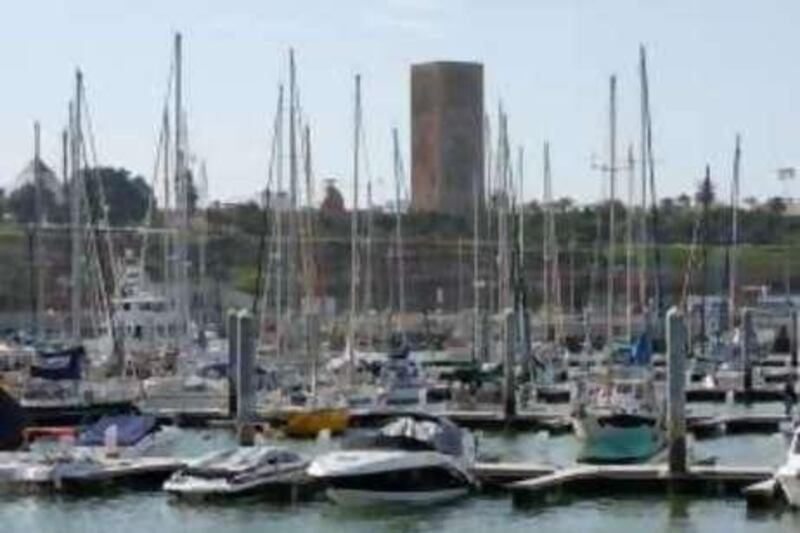RABAT // Eight centuries ago, a Moroccan king raised a tower on the banks of the river Bouregreg, commencing a grandiose project that is finally on the point of completion. The king was Yacoub al Mansour of the Almohad dynasty, whose empire stretched from Spain to the Sahara. His tower, intended as the minaret of a gargantuan mosque, stood at the centre of a planned capital straddling the Bouregreg where it meets the Atlantic. Yacoub died, leaving his mosque and city unfinished. In their place are Morocco's modern capital, Rabat, and the working-class sprawl of Salé on the opposite bank. But now the two cities are merging thanks to a government project to unite them as a powerhouse of commerce, tourism and national prestige. Many Rabatis and Slaouis, as the cities' inhabitants are known, look forward to new jobs and infrastructure. But some fear that development will cost their home its sleepy charm. Morocco broke ground on the US$4 billion (Dh14.74bn) Bouregreg project in 2006 and plans to complete major work in 2010. New breakwaters have appeared, the estuary sports a new marina and corniche, and the grinding of heavy machinery echoes through Rabat as workers lay rails for a tram system spanning the river. The river flats will be covered in swish new houses and business parks, and resort hotels will stud the coastline. UAE firms Sama Dubai and Sorouh Real Estate are supplying investment and building expertise, but the government promises Moroccans that their capital will not become a Gulf-style megalopolis. "Rabat and Salé are rich in heritage, and Rabat doesn't lend itself to skyscrapers," said Omar Benslimane, a spokesman for the government agency overseeing the project. "But this project will raise the capital to an international level." Mr Benslimane said the government was determined to finish the project even if the global economic crisis knocked out investors, and has built up $3.25bn emergency fund to keep working while new investment is sought. Rabat has long been outpaced in the quest for glory by such imperial cities as Fez and Marrakech as well as Casablanca, Morocco's modern commercial hub. Salé, formerly grander than Rabat, now serves as the capital's bedroom community. Carthaginians first settled the area, followed by the Romans, whose dead still lie under tombstones bearing Latin inscriptions. Muslim dynasties encompassed the estuary with walls and forts, but the land within remained largely unsettled. In the 17th century, Muslims expelled from Spain made the twin cities of Rabat and Salé a den of piracy, menacing European ships and ports as far away as Iceland. The Alaouite dynasty stamped out the pirates, but failed to attract newcomers to the Bouregreg. When France took control of Morocco in 1912, Hubert Lyautey, the resident general, chose Rabat as a neutral site to establish French dominance. Beside the medina, Lyautey built a modern city of French colonial architecture and broad avenues suggesting Paris with palm trees. "Lyautey wanted to continue the work of Yacoub al Mansour," said archaeologist Mohamed Es-Semmar, who heads the history and archaeology division of the government's Bouregreg agency. "But he chose only the south bank, which still left two cities - Rabat and Salé." It has fallen to King Mohamed VI to finish the job of uniting them, said Mr Es-Semmar. Modern technology has enabled engineers to stop the Bouregreg's seasonal flooding, which previously made the valley floor uninhabitable. Mr Benslimane, the Bouregreg agency spokesman, said it was unclear whether Rabat and Salé will eventually share a mayor. But the two cities already share an economy that will benefit from deeper integration. "The cost of living will rise, but people will also see new jobs created and have greater purchasing power," said Taji Eddine El-Houssaini, an economics professor at Rabat's Mohamed V University. "The big risk is spoiling Rabat's historic image." While development should enhance Rabat's tourist appeal, too much may backfire, repelling foreigner visitors seeking old stones and colourful markets, Mr El Houssaini said. Down on the riverbank, the Bouregreg's fishermen agree. "A cafe, that's nice, but a fishing boat completes the picture," said Rachid Tahiri, who owns one of the small blue skiffs that ply the coastal waters. Mr Tahiri has bigger worries. Hotels are planned for the beach where the fishermen unload the day's catch. The government is building new moorage, but Mr Tahiri is afraid that the fishermen will be forced out by the rush of development. Others see new possibilities in displacement. "Rabat hasn't changed in 30 years," said Khalid, whose pastry dough factory was seized by the government as part of land expropriation for the Bouregreg project. Now Khalid is queuing outside the Bouregreg agency office in downtown Rabat, hoping to negotiate new property in one of the planned industrial sites. "If things are done well, everyone will benefit from this project," he said. Much of the Bouregreg project has yet to be built. But the new marina on the Salé riverbank offers a taste of things to come. Sailboats, mostly European, occupy the slips. Cafe waiters in chic black uniforms glide along the quay, serving ice cream and café au lait to dozens of well-to-do Rabatis and Slaouis. Hind Jaidi, 27, who works for an import-export company in Casablanca, comes here often. Today, she is sharing a pot of mint tea with a group of friends. "It's lovely here," she said. "There's an air of modernisation." "Yes, and that makes one proud," added her friend Mehdi Benmaiza, 29, who works for a Casablanca marketing firm. "But I grew up near the river, I know its charm. Things shouldn't get too modern." jthorne@thenational.ae
A tale of two cities becoming one
A US$4bn project will merge the Moroccan cities of Rabat and Salé, bringing new infrastructure and jobs, but modernisation will come at a price.

Editor's picks
More from the national




